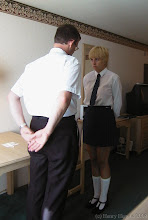The excuse offered by the wretched master of the Hoo union workhouse for flogging [girls] - a charge now under strict investigation - is that they are more tender than youthful culprits of the other sex, and that, consequently, there is more "feeling" about them...
John Bull reported the proceedings in more detail:
We do not extract the following morceau from the examination of the master of some Union Bastille, to show the barbarities which are practised in those dens, but, on the contrary, to exhibit the "finery" of language adopted by the unfortunate victims of oppression in describing their sufferings :-Eliza Screese examined - I was punished several times by the master, who beat me with a birch rod on my bare back. I had all my things off but my "change" and my flannel petticoat,and that was tied round my waist every time I was flogged. By my "change" I mean my chemise. I had nothing else on except shoes and stockings. I had pulled off my other things by order of the defendant, who then flogged me with a birch rod on my naked back. He made me pull the chemise sleeve off, and tie my clothes round my waist, so that I was naked to my waist. I was beaten on the shoulders, and as low down as the strings of my petticoat. I was beaten just the same way more than once. The master once pulled up my clothes, and beat me on the bare person. I was beaten each time in the women's hall. I laid myself on the table. Fanny Roberts and Mrs. Low held me by the hands. I saw other persons flogged in the same was as I was. The defendant's wife is matron, but I was never corrected by her when I was naughty.
The delicacy on the part of a pauper in calling a shift a "change" and eventually a "chemise," is perhaps one of the most curious signs of the times that has yet been exhibited.
The master was sent for trial at the Assizes. The Age commented in February:
We are glad to find that the Justices of the Peace for that district of the County of Kent, in which the Hoo Union is situated, have met, and come to the determination of prosecuting MILES, the Master of the Workhouse, who was proved to have been guilty of such atrocious and disgusting conduct towards the unfortunate charity girls under his control. We do not wish to prejudge the case ;but we cannot help saying, that if the Jury do not pay the closest attention to the evidence, and fearlessly give their verdict, a precedent may be set which will work with awful results throughout England.
But in April The Satirist reported again:
Miles, the flogging master of the Hoo Union, has had a lucky escape for the want of a prosecutor. The Poor-law commissioners decline to prosecute, as is but natural ; they have no very strong objection to the flogging system, provided it can be carried on without scandal. They consequently left the affair to take its chance. The Government sees no necessity for interference ; and the county justices, who first took the matter up, now abandon it altogether. All this clearly shows that there is no innate repugnance to the practice of flogging in workhouses, if means are found to keep the "sufferers" quiet. Miles will learn to be prudent from the past. He will indulge his appetite for flogging more discreetly in future. Flogging, so as not to be found out, will be the great point with such masters of workhouses as Mr. Miles.
And this provides the background for our scene. Eliza is back in the workhouse, and James Miles and the Poor-law Commissioner are following the paper's exhortation. They will make sure young Eliza regrets causing them such inconvenience. This time there will be no witnesses, though no doubt the other girls will hear what has happened and will learn the value of silence...














